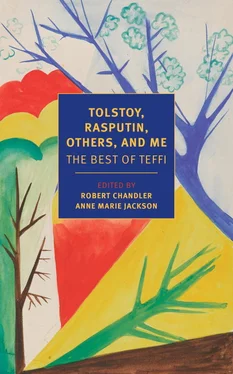“Why are you looking so sad, my charming lady?”
The “old man” was standing beside me, smiling roguishly. “I’ve suffered a real tragedy,” he said. “My devil’s gone missing. I’m at my wit’s end. I’m going to ring the police. They need to carry out a search. There may be a dangerous criminal in our midst.”
He smiled. What he said about the police was, of course, a joke.
“How old are you?” he asked suddenly.
“I’ll be fifteen soon. In ten months.”
“Aha! As soon as that! So in three years’ time I could be marrying you. If only my dear little devil hadn’t disappeared so inexplicably. How will I be able to make my wife happy now? Why are you so silent? Do you think I’m too old for you?”
“Not now,” I answered gloomily. “But in three years’ time you’ll be an important general.”
“A general. That’s a nice thought. But what can have happened to my devil?”
I looked up into his face. I hated him so much and I was so hugely unhappy that he stopped smiling and walked away.
And I went to my friend’s room and, hiding behind the curtain (not that there was anyone else in the room), I took out the devil. He was a little squashed, but there was something else besides. He had changed. Looking at him no longer made me feel the least bit happy. I didn’t want to touch him, and I didn’t want to laugh. He was just the most ordinary devil, green chenille with a little silver tail. How could he make anybody happy? How ridiculous it all was!
I stood up on the window sill, opened the small pane at the top and threw him out on the street.
Nanny was waiting for me in the hall.
The officer walked up to us, glanced at Nanny and chuckled: “Here to collect our Queen Cleopatra, are you?”
And then he fell silent, looked at me thoughtfully and said, simply and kindly, “Off you go. Off to bed with you, little one. You’ve gone quite pale. God bless you.”
I said goodbye and left, quiet and tired.
B-o-r-i-n-g. [2] Twenty years later, in 1947, Teffi ended her article about Baba Yaga, the archetypal old witch of Russian folk tales, with an almost identical single word paragraph: “B-o-r-i-n-g” (“ Sku-u-uchno ”). She was clearly alluding to this story, which ends with the same word. As an adolescent Teffi wanted to be a Cleopatra; in 1947, in her mid-seventies, she sees herself as Baba Yaga. See Robert Chandler, Russian Magic Tales from Pushkin to Platonov (London: Penguin Classics 2012). In this translation we have drawn the word out, in order to lend it the appropriate emotional weight; Teffi draws the word out in her 1947 article, but not in “The Green Devil” itself.
1925 Translated by Rose France
I was in my twenty-first year.
She, my daughter, was in her fourth. [1] Teffi was young when she had her first child, but not as young as this implies. She married in January 1892 and, aged twenty, gave birth to her daughter Valeria in November that year. Her marriage was deeply unhappy and Teffi eventually abandoned her husband and children, returning to St Petersburg and soon beginning to earn her living as a professional writer.
We were not well matched.
I was rather nervy and unpredictable at that time, usually either crying or laughing.
Valya, on the other hand, was very even-tempered and calm. And from morning to night she was engaged in commerce—bargaining with me for chocolates.
In the morning she would not get up until she was given a chocolate. Nor would she go out for a walk, come back from a walk, have breakfast, have lunch, drink milk, get into the bath, get out of the bath, sleep or comb her hair except for a fee—a chocolate. Without chocolate, all life would come to a standstill, all activity replaced by a deafening, systematic howl. Then I would feel I was a monster, a child-killer. And I would give in to her.
Valya despised me for my lack of good sense—that was clear enough. But she didn’t treat me too badly. Sometimes she would even pet me with her soft, warm hand, which was always sticky from sweets.
“You’re so pretty,” she would say. “You have a nose like my elly-phant.”
Not particularly flattering. But I knew that my daughter thought her little rubber elephant more beautiful than the Venus de Milo. We all have our different ideals. So I was happy to hear her say this, although I tried not to encourage endearments from her when there were other people around.
Apart from sweets, Valya was interested in very little. Though once, while drawing moustaches on some elderly aunts in a photograph album, she asked in passing, “So where is Jesus Christ now?”
And, without waiting for an answer, she demanded a chocolate.
She was very strict about decorum. She insisted on being the first to be greeted by everyone. On one occasion she came up to me very upset and indignant indeed: “Motya the cook’s daughter has gone out on the balcony in only her skirt,” she said. “And there are geese out there.”
Yes, she was very punctilious.
It seemed that year as if Christmas would be a rather sad, anxious time. Sometimes I was able to laugh, since I wanted so badly to live on God’s earth. But more often I cried, since life was proving almost beyond me.
For days on end Valya talked with her little elephant about a Christmas tree. It was clear that I would have to get hold of one.
In secret, I ordered some Dresden ornaments from Muir and Mirrielees. [2] A department store in Moscow run from 1880 to 1918 by two Scottish businessmen, on the site of what is now the Central Department Store (TsUM) on Theatre Square. “Dresden ornaments” were, for the main part, produced between 1890 and 1910. They were made from cardboard, dampened to make it flexible, and then gilded, silvered or painted.
I unpacked them at night.
They were absolutely wonderful: little houses and lanterns, parrots in golden cages. But best of all was a little angel, all covered in gold glitter, with iridescent mica wings. The angel hung on a piece of elastic and its wings fluttered when it moved. What the angel was made of, I don’t know. It could have been wax. It had pink cheeks and it held a rose in its hands. I had never seen anything so marvellous.
And at once I thought, “Better not hang it on the tree. In any case its beauty will be lost on Valya. She’ll only break it. I’ll keep it for myself.”
So that’s what I decided to do.
But in the morning, Valya sneezed. She must have caught a cold, I thought. I was seized with anxiety.
She might look chubby, but that didn’t mean she wasn’t delicate. I didn’t take good enough care of her. I was a bad mother. And now, wanting to keep the best for myself, I’d hidden the angel. “Its beauty will be lost on her,” I had said to myself. But if that were the case, it was only because I hadn’t taught her to appreciate beauty.
On the night before Christmas, when I was decorating the tree, I took out the angel. I looked at it for a long time. What a pretty little thing it was, with that rose in its chubby little hand. It looked so cheerful, so rosy-cheeked, yet so gentle. An angel like that should be hidden away in a box, and only on bad days—when the postman brought me horrid letters, and the lamps burned low and the wind made the roof rattle—only then should I allow myself to take it out, to dangle it gently on its elastic and watch the glitter of the gold and the play of light on the mica wings. This might not sound like much. It might sound sad. But did I have anything better to look forward to?
I hung the angel high up on the tree. It was the most beautiful of all the ornaments, so it had to be in the place of honour. But all the time there was another thought in my head—a secret, mean thought. High up, it would be less obvious to smaller persons .
Читать дальше












